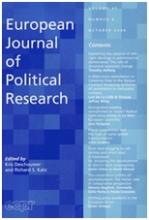Blame Shifting and Blame Obfuscation: The Blame Avoidance Effects of Delegation in the EU
by Tim Heinkelmann-Wild, Bernhard Zangl, Berhold Rittberger, and Lisa Kriegmair
 The delegation of governance tasks to third parties is generally assumed to help governments to avoid blame once policies become contested. International organizations, including the European Union (EU), are considered particularly opportune in this regard. The literature lacks assessments of the blame avoidance effects of delegation, let alone of the effects of different delegation designs. To address this gap in the literature, we study public blame attributions in the media coverage of two contested EU policies during the financial as well as the migration crisis. We show that the blame avoidance effect of delegation depends on the delegation design: When agents are independent (dependent) of government control, we observe lower (higher) shares of public blame attributions targeting the government (blame shifting effect), and when agents are external (internal) to the government apparatus, overall public blame attributions for a contested policy will less (more) frequent (blame obfuscation effect). Our findings yield important normative implications for how to maintain governments’ accountability once they have delegated governance tasks to third parties.
The delegation of governance tasks to third parties is generally assumed to help governments to avoid blame once policies become contested. International organizations, including the European Union (EU), are considered particularly opportune in this regard. The literature lacks assessments of the blame avoidance effects of delegation, let alone of the effects of different delegation designs. To address this gap in the literature, we study public blame attributions in the media coverage of two contested EU policies during the financial as well as the migration crisis. We show that the blame avoidance effect of delegation depends on the delegation design: When agents are independent (dependent) of government control, we observe lower (higher) shares of public blame attributions targeting the government (blame shifting effect), and when agents are external (internal) to the government apparatus, overall public blame attributions for a contested policy will less (more) frequent (blame obfuscation effect). Our findings yield important normative implications for how to maintain governments’ accountability once they have delegated governance tasks to third parties.
In: European Journal of Political Research. Online first: https://doi.org/10.1111/1475-6765.12503. Supporting data and materials for this article are available at Open Data LMU.

